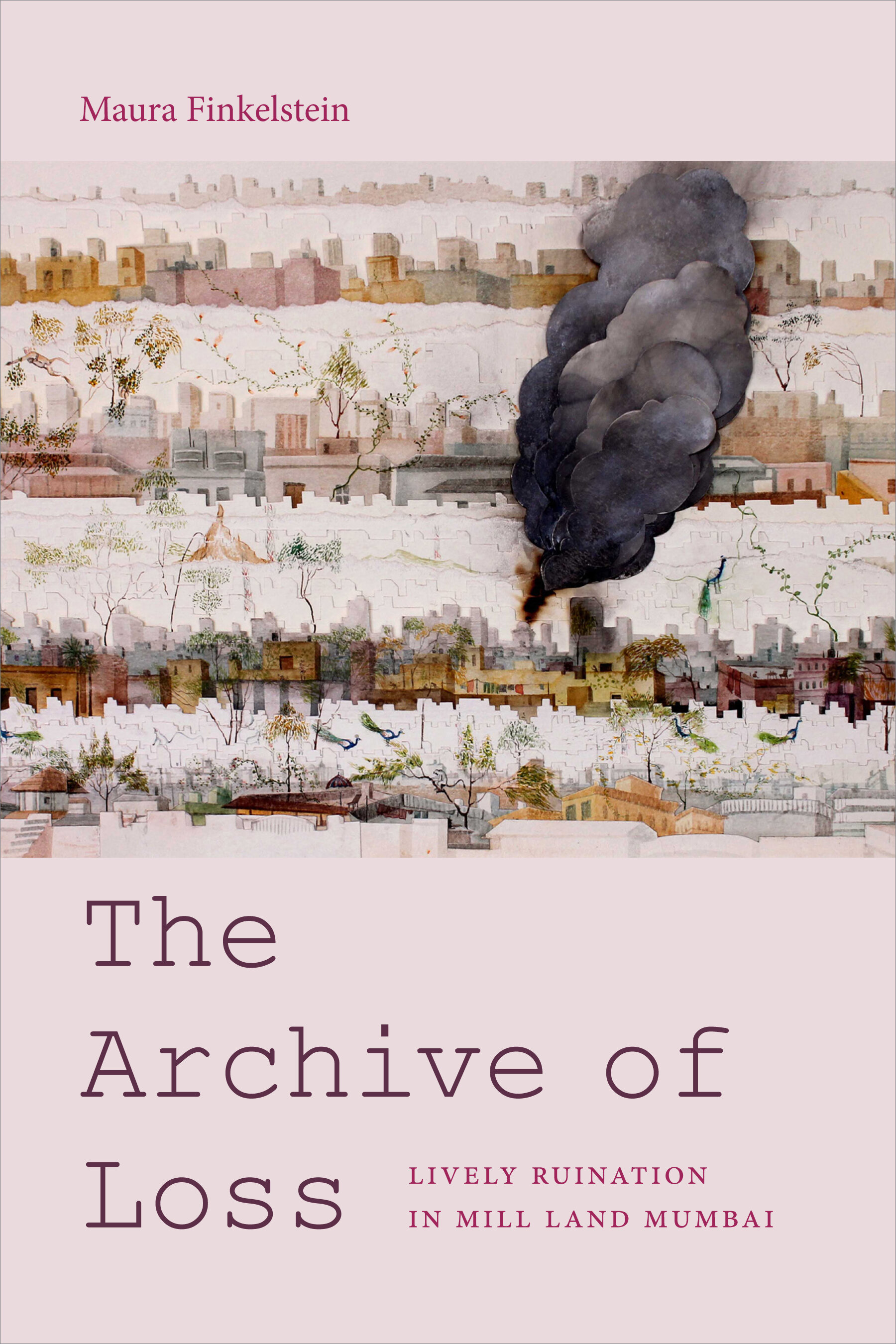The Archive of Loss: Lively Ruination in Mill Land Mumbai (Duke University Press, 2019)
The Archive of Loss: Lively Ruination in Mill Land Mumbai (Duke University Press April 2019), surrounds a functional textile mill in a city with no functional textile mills. Through the mill space, called “Dhanraj Spinning and Weaving Ltd,” the book asks what is missed through this misrecognition of industrial remains: spaces in which formal and informal economies collide and multiple temporalities overlap.
The Archive of Loss argues that Dhanraj is an ethnographic archive of the city where documents, artifacts, and stories exist in the buildings and the bodies of workers. The lives of current textile mill workers are central to the book’s story: their pain, illnesses, injuries, and exhaustion narrate industrial decline; their lives in tenement buildings reveal a disavowed dimension of the modern values expounded by modernity; and the rumors and untruths they share about mill strikes and industrial fires help them make sense of the industry’s survival. In outlining this archive’s contents, the book shows how Dhanraj, conceptualizes as a “lively ruin,” becomes a lens through which to challenge, reimagine, and alter ways of thinking about the past, present, and future of urban labor, ruination, and the untimely embodied experience of industrial temporality.
Listen to “The New Books Network” podcast interview here.
What People Are Saying
“A wonderful critique of deindustrialization, archives, and the afterlives of the great mills of Mumbai, this book is a timely contribution to thinking on temporality, loss, space, and affective entanglements within rapidly changing cities across South Asia. Maura Finkelstein seeks nothing less than to reveal how ideas and spaces are translated into places. This thoughtful view of a key site of Mumbai's ongoing transformations is essential reading for scholars of the city in uncertain times."
— Svati Shah, author of Street Corner Secrets: Sex, Work, and Migration in the City of Mumbai
“Finkelstein’s work is very refreshing. It is not at all simplistic nor does it focus on ‘one issue’ to tell the story. The data involved is rich, and the theoretical framings and arguments very persuasive…. The book itself… is narrated through a gripping form of storytelling: in many ways it is reminiscent of a thriller novel as the various layers of the story are revealed.”
— Sinead D'Silva, LSE Review of Books
“Finkelstein is a sure-footed guide to the old mill space, especially since she takes her reader on a journey through the process and deep questioning of her fieldwork, of her own sense of being lost and coming into a kind of knowingness, of being informed through the people she meets and the time she spends. In the process we can under- stand and sense how the ethnographer has learned from the doing, and her insights about the ethnographic enterprise itself might be reason enough to read this book.”
— Rashmi Sadana, The Asia Pacific Journal of Anthropology
“The Archive of Loss is an exemplary ethnography of a world in transition, caught as it is between an industrial past and post-industrial present, and the unexpected openings—material, social, political—of seeing this world otherwise.”
— Waqas H. Butt, Anthropological Quarterly
“In this beautifully written and rich ethnography, Maura Finkelstein demonstrates that the dynamics contributing to industrial job loss crosscut regions, countries, and cities. Her book offers highly compelling theoretical insights on memory, embodiment, and urban space and will lead to a much-needed rethinking of deindustrialization itself."
— Christine J. Walley, author of, Exit Zero: Family and Class in Postindustrial Chicago
“Finkelstein’s work provides a rich ethnography of the making of precarious workers and their feelings of displacement. Armed with an arsenal of scholarly theories and concepts, she brings the voices and experiences of the workers into our struggle to understand what precarity means for workers living in the shadows of Mumbai’s development. At the same time, she questions the rhetoric of the gentrification of global cities such as Mumbai and refreshingly refuses to follow a linear narrative as she moves from Mumbai mills to the workers, to the slums, to the strikes, the mill owners and the mill fires… The ethnographic study disrupts the linear progress of deindustrialisation and gentrification in an old city such as Mumbai. The story of the fires, employers’ desires, the laws and the insecure downward mobility of the workers is not a narrative of gentrification but it is a narrative that needs to be told.” .”
— Vicki Crinis, Asian Studies Review
“The conceptual framing of the book is refreshingly original, the prose elegant and the structure convincing…. The book provides an important and timely ‘disruption’ to an established narrative. It helps us understand decay as a process, a chronoscape in its own right that operates at a much more intimate level than labels such as (post-)industrialism may suggest. By carefully spelling out phenomena that do not fit into established narratives, the book illuminates the blind spot of dominant explanations.”
— Pablo Holwitt, South Asia: Journal of South Asian Studies
“How does one live in a place that refuses to recognize one’s existence? This question motivates cultural anthropologist Maura Finkelstein’s ethnographic work in Mumbai whose textile mills were once central for the city’s industrial profile…. the book offers a detailed description of decay and ruination as a prolonged process that follows its own logic and unfolds according to its own rules, supporting a ghostly presence of the past that refuses to die down.”
— Natalia Kovalyova, Anthropology Book Forum
